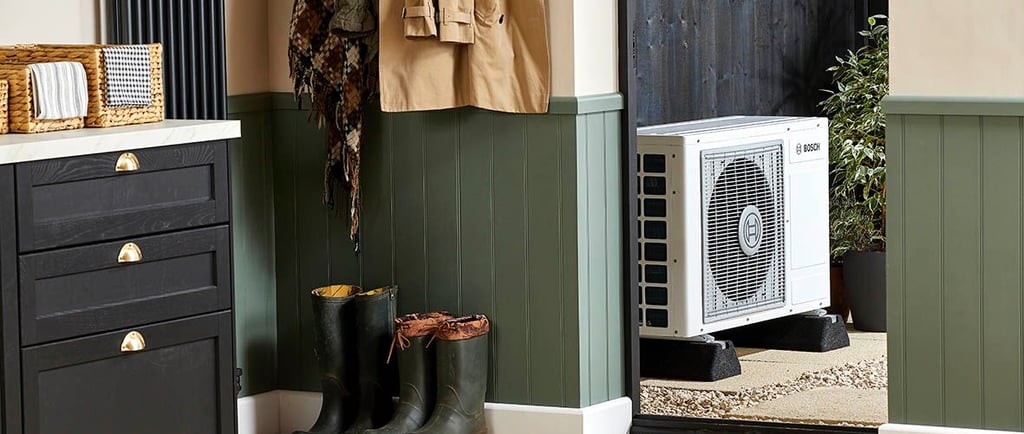The Future of Home Heating: Why Heat Pumps and Renewable Energy are Ideal for Swansea and Bristol
In this blog, we’ll dive into how heat pumps work, the types available, their benefits, and why pairing them with renewable energy is an excellent investment for homes in this region.
9/2/20243 min read


1. Understanding Heat Pumps
A heat pump is an energy-efficient device that transfers heat from one location to another, essentially acting like a reverse air conditioner. They absorb heat from external sources (air, ground, or water) and transfer it indoors to warm your home.
The UK offers two primary types of heat pumps for home heating:
Air Source Heat Pumps (ASHP): These systems extract heat from the outdoor air. They are a popular choice because they are relatively easy to install, work well in a wide range of temperatures, and are particularly suited to mild climates like that of the Swansea-Bristol region.
Ground Source Heat Pumps (GSHP): These systems draw heat from the ground, where temperatures are relatively stable year-round. While installation can be more complex and costly, they are highly efficient and can provide more consistent heating in colder weather.
2. Why Heat Pumps Are Ideal for Swansea and Bristol
Swansea and Bristol experience a temperate maritime climate, with mild winters and moderate summer temperatures. This makes air-source heat pumps (ASHP) particularly effective, as they can efficiently extract heat from the air even when temperatures are relatively low.
The region’s mild weather means that heat pumps don’t have to work as hard to maintain a comfortable indoor temperature. As a result, they tend to operate efficiently year-round, helping homeowners reduce both their carbon footprint and energy bills.
3. Benefits of Installing a Heat Pump
Here’s why a heat pump could be an excellent investment:
Lower Energy Bills: By extracting heat from renewable sources, heat pumps use less electricity compared to traditional gas or oil heating systems. Over time, this can lead to substantial savings on energy costs.
Reduced Carbon Emissions: Heat pumps use significantly less fossil fuel and emit fewer greenhouse gases, making them a greener alternative for home heating.
Low Maintenance: Once installed, heat pumps require minimal maintenance, and they have a long lifespan compared to traditional boilers.
Eligibility for Government Incentives: In the UK, heat pump installations can qualify for government incentives like the Boiler Upgrade Scheme, which helps offset the cost of installation.
4. The Power of Renewable Energy: Pairing Heat Pumps with Solar Panels or Wind Power
For homeowners looking to go a step further, pairing heat pumps with renewable energy sources such as solar panels or small wind turbines is an excellent way to increase energy savings and sustainability.
Solar Panels: Solar panels can generate electricity to power the heat pump, reducing reliance on the grid and further lowering energy costs. In sunny periods, the energy produced by solar panels can even exceed the home’s needs, providing an opportunity to store or sell excess energy back to the grid.
Wind Power: Although small wind turbines are less common, certain areas in Swansea and Bristol can support them. When paired with a heat pump, wind-generated power can provide an additional renewable energy source, making your home even more resilient to rising energy costs.
5. Costs and Financing Options
While the upfront cost of installing a heat pump can be higher than traditional systems, the UK government provides incentives to make it more affordable. For example, the Boiler Upgrade Scheme offers grants to offset heat pump installation costs. Additionally, financing options are available through energy companies, local councils, and some financial institutions, helping make the initial investment more manageable.
6. How to Get Started with Heat Pumps and Renewable Energy in Swansea and Bristol
Research and Consult: Start by consulting with a certified heat pump installer to evaluate your home’s suitability for a heat pump and renewable energy systems. Look for local companies that understand the climate and building requirements specific to the area.
Check Eligibility for Grants: Ensure that you’re taking advantage of available government incentives to reduce costs.
Plan for Complementary Systems: If you’re interested in combining your heat pump with solar panels or wind turbines, discuss these options with your installer and utility provider to determine the most cost-effective setup.
Prepare for Installation: Once all assessments are complete, work with your installer to ensure a smooth and efficient installation process. Depending on the type of heat pump and any additional systems, installation times can vary.
Conclusion
Investing in a heat pump and renewable energy for your Swansea or Bristol home is a smart way to future-proof your property while enjoying immediate savings on energy costs. As the UK continues to transition toward sustainable energy solutions, homeowners who make these upgrades will benefit from lower bills, reduced carbon footprints, and the satisfaction of contributing to a greener future.
Making the shift to renewable heating may require an initial investment, but with government incentives, falling energy prices, and growing climate awareness, the long-term advantages for homeowners in the Swansea and Bristol area have never been clearer.
Get In Touch
Award winning heating installers and 'excellent' rated home care plans.
© 2026. All rights reserved.
Message us on WhatsApp: 07457405012
Call us on: 01792 209407
